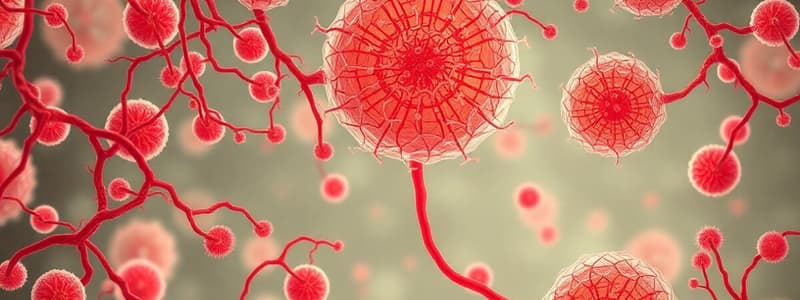Podcast
Questions and Answers
Quel est le principal site de l'hématopoïèse chez l'adulte?
Quel est le principal site de l'hématopoïèse chez l'adulte?
- Sac vitellin
- Foie
- Moelle osseuse (correct)
- Rate
Les érythrocytes sont capables de se développer à partir des précurseurs érythroïdes.
Les érythrocytes sont capables de se développer à partir des précurseurs érythroïdes.
True (A)
Nommez deux types de lignées cellulaires qui proviennent des progéniteurs myéloïdes communs (CMPs).
Nommez deux types de lignées cellulaires qui proviennent des progéniteurs myéloïdes communs (CMPs).
Érythrocytes et plaquettes
Les _____ sont responsables de la production d'anticorps.
Les _____ sont responsables de la production d'anticorps.
Associez chaque type de cellule aux hormones responsables de leur développement:
Associez chaque type de cellule aux hormones responsables de leur développement:
Quel est le rôle des granulocytes dans l'organisme?
Quel est le rôle des granulocytes dans l'organisme?
Les HSCs (cellules souches hématopoïétiques) sont uniquement présentes dans le foie.
Les HSCs (cellules souches hématopoïétiques) sont uniquement présentes dans le foie.
Quelle hormone stimule la production de plaquettes dans le corps?
Quelle hormone stimule la production de plaquettes dans le corps?
Flashcards
Hématopoïèse
Hématopoïèse
Le processus de développement et de production des cellules sanguines.
Progeniteurs myéloïdes communs (PMC)
Progeniteurs myéloïdes communs (PMC)
Cellules qui se différencient en cellules du sang rouge, plaquettes et granulocytes.
Progeniteurs lymphoïdes communs (PLC)
Progeniteurs lymphoïdes communs (PLC)
Cellules qui se différencient en lymphocytes (B, T, NK).
Cellules souches hématopoïétiques (CSH)
Cellules souches hématopoïétiques (CSH)
Signup and view all the flashcards
Thrombopoïèse
Thrombopoïèse
Signup and view all the flashcards
Érythropoïèse
Érythropoïèse
Signup and view all the flashcards
Granulopoïèse
Granulopoïèse
Signup and view all the flashcards
Facteurs influençant l'hématopoïèse
Facteurs influençant l'hématopoïèse
Signup and view all the flashcards
Study Notes
Hematopoiesis: Overview
- Hematopoiesis is the process of blood cell development and production.
- It begins in the yolk sac during embryonic development.
- Later, the liver and spleen become important sites for hematopoiesis.
- In adults, hematopoiesis primarily occurs in the bone marrow.
- Different blood cell lineages originate from hematopoietic stem cells (HSCs).
Hematopoietic Stem Cells (HSCs)
- HSCs are multipotent cells, capable of differentiating into various blood cell lineages.
- They are characterized by their ability for self-renewal.
- They are generally found in the bone marrow.
- HSCs give rise to common lymphoid progenitors (CLPs) and common myeloid progenitors (CMPs).
Common Lymphoid Progenitors (CLPs)
- CLPs differentiate into lymphocytes, which include B cells, T cells, and natural killer (NK) cells.
- These lymphocytes play pivotal roles in the immune response.
- B cells mature in the bone marrow and produce antibodies.
- T cells mature in the thymus.
Common Myeloid Progenitors (CMPs)
- CMPs differentiate into various myeloid lineages, including erythrocytes, platelets, and granulocytes (neutrophils, eosinophils, basophils).
- Erythrocytes carry oxygen throughout the body.
- Platelets are crucial for blood clotting.
- Granulocytes participate in combating infections.
Erythropoiesis (Red Blood Cell Development)
- Erythrocytes are formed from erythroid precursors.
- This process involves a series of differentiation steps.
- Erythropoietin (EPO) is a key hormone that stimulates erythropoiesis.
Thrombopoiesis (Platelet Development)
- Platelets arise from megakaryocytes.
- Megakaryocytes are large cells that fragment to release platelets.
- Thrombopoietin (TPO) is fundamental in regulating the production of platelets.
Granulopoiesis (Formation of Granulocytes)
- Neutrophils, eosinophils, and basophils are produced from granulocyte-macrophage progenitors.
- Each type of granulocyte plays a distinct role in the immune response.
- Mature neutrophils are phagocytic, engulfing and destroying pathogens.
Factors Affecting Hematopoiesis
- Hormones, including EPO and TPO, significantly influence the rate and type of blood cell production.
- Growth factors also impact hematopoiesis.
- Nutritional deficiencies, infections, and genetic disorders can interfere with the normal process of blood cell formation.
Clinical Significance of Hematopoiesis
- Disorders of hematopoiesis can lead to various hematological conditions.
- Anemia is a condition characterized by a reduced number of red blood cells or deficient hemoglobin.
- Leukemia is a type of cancer that affects blood cells.
- Blood disorders can significantly affect an individual's health and require careful management.
Studying That Suits You
Use AI to generate personalized quizzes and flashcards to suit your learning preferences.




